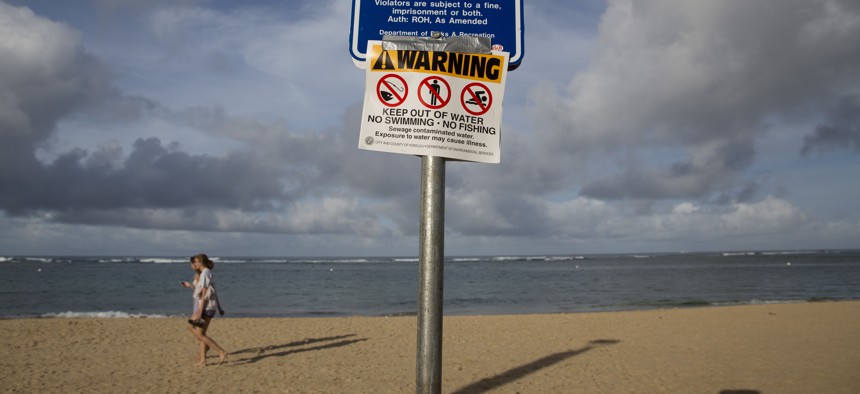What the House Water Resources Development Bill Leaves Out

This August 2015 photo shows a warning sign posted on Waikiki Beach in Honolulu after sewage from a treatment plant spilled near the ocean. AP Photo/Jae C. Hong
Water and sewer utility provisions found in the Senate version of the legislation aren't included in the House draft.
WASHINGTON — A water infrastructure bill House lawmakers released on Friday would not extend a federal lending program for water and sewer projects and also leaves out language that would rework how wastewater utilities go about meeting federal standards under the Clean Water Act.
Provisions dealing with both these issues are included in a Senate version of the bill, and have the support of groups that represent local government interests and some public utilities.
Leaders on the House Transportation and Infrastructure Committee kept their Water Resources Development Act, or WRDA, legislation focused tightly on the Army Corps of Engineers, which is involved in infrastructure such as locks, dams, harbors and reservoirs.
Setting policy for the Army Corps is traditionally the primary purpose of WRDA bills, which in recent years have come up on a biennial basis.
But the WRDA package the Senate Environment and Public Works Committee unveiled earlier this month includes language to reauthorize the Water Infrastructure Finance and Innovation Act.
Both the Corps and the Environmental Protection Agency have authority to issue WIFIA loans. But so far only EPA has gotten the program up and running, issuing its first loan last month.
The EPA program is designed to provide low-cost loans for major water and wastewater projects.
WIFIA is set to expire at the end of fiscal year 2019. The Senate bill would extend it through 2021.
The WRDA bill is not a spending measure so it would not appropriate any money for WIFIA. But reauthorizing the program would pave the way for future appropriations. Between fiscal years 2017 and 2018, lawmakers allotted about $90 million for the program.
Also in the Senate bill is a "Water Infrastructure Flexibility" section that would set into law an "integrated planning" framework for wastewater and stormwater utilities.
Around the U.S. there are aging sewer and stormwater systems in need of upgrades so that they don't spill polluted wastewater into rivers, off coasts, or into other bodies of water. But these improvements can cost millions of dollars, and can even run upwards of a billion dollars in some cases, posing a heavy financial lift, especially in communities with economic troubles or shrinking populations.
The integrated planning framework is meant to provide flexibility for local governments to stagger and sequence wastewater and sewer upgrades in a way that they can afford, but that also gets them into compliance with federal law as fast as possible.
It's a voluntary alternative utilities can look to, instead of going to court to hash out a "consent decree" with state or federal regulators—a process that can be time consuming and sometimes hostile.
Even though EPA issued the integrated planning framework in 2012, it hasn't become widely popular among state regulators who often oversee Clean Water Act permitting, or regional EPA offices.
Proponents hope codifying the framework into law would help it to gain traction as an alternative to the consent decree process.
Neither the WIFIA reauthorization or the integrated planning language appear in the House bill.
In a joint letter last month, the National League of Cities, National Association of Counties, and the U.S. Conference of Mayors thanked the Senate Environment and Public Works Committee for including the integrated planning language in their WRDA draft.
Carolyn Berndt, program director for sustainability in the federal advocacy department at the National League of Cities said by email on Friday that the WIFIA reauthorization, and the integrated planning framework are priorities for NLC. As is the reauthorization of the state revolving funds, another set of waterworks financing programs.
"We hope that the House will take up these priorities in short order," she added.
Berndt said NLC was still reviewing the House legislation, but emphasized that the group is supportive of the bipartisan effort taking place in Congress to advance a WRDA bill on a two-year cycle.
She specifically applauded language in the House bill that aims to ensure the full revenues going to the Harbor Maintenance Trust Fund are used for port and harbor projects and not other expenses.
Groups that endorsed the WIFIA reauthorization in the Senate bill included the American Water Works Association, the Association of Metropolitan Water Agencies, the National Association of Clean Water Agencies and the Water Environment Federation.
"There is some time for WIFIA reauthorization in amendments, conference or another legislative vehicle," Tommy Holmes, legislative director for the American Water Works Association, noted on Friday.
The American Water Works Association, the Association of Metropolitan Water Agencies and the Water Environment Federation strongly oppose stitching a piece of legislation into the WRDA bill that would blend elements of WIFIA and the state revolving funds.
A committee markup hearing is scheduled for Wednesday for the House WRDA legislation.
Bill Lucia is a Senior Reporter for Government Executive's Route Fifty and is based in Washington, D.C.
NEXT STORY: Adobe gets first FedRAMP Tailored authorizations






